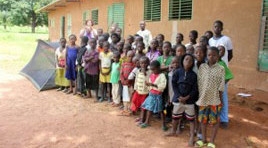From VOA Learning English, this is the Health Report.
Even though Malaria can be both prevented and treated, the disease is the third biggest killer of children in the world. Malaria is caused by bites from insects called mosquitoes. People who sleep in beds covered by special nets are less likely to be infected. When the nets are used correctly, they prevent the flying insects from biting people as they sleep.

Primary school students learned about malaria during this year's universal bed net distribution.
Susan Eckhart is a Peace Corps volunteer in the Western African country of Burkina Faso. Malaria is responsible for about 9,000 deaths there every year.
"Malaria is everywhere. People live with it just as we live with a common cold. They blame everything on Malaria. They are not aware of how it is transmitted. They have become reliant on treatment better than prevention."
As soon as someone reports a high body temperature, they are given medicine to treat Malaria. Ms Eckhart says Malaria medicine is used at the first sign of sickness because it costs less than the test to identify the disease. There is a lot of misunderstanding about Malaria and a lack of good information.
"They do get a lot of information about illnesses that confuse them all, so they are not sure if they are talking about Cholera or Malaria or AIDS."
In 2011, the Peace Corps launched Stomp Out Malaria in Africa. Peace Corps volunteers are trained so they can be directly involved in education to prevent Malaria. Ms Eckhart is one of the volunteers who presents lessons in fun ways that will help the children remember.
"The one with most fun was a tag game where two kids play the roles of mosquitoes and if they tagged someone, that person became infected and had to sit down."
Susan Eckhart teaches students from first grade through fifth grade. Older children who had attended a leadership camp came to help with the games. The older children also translated the Malaria information into the local Dagaare language.
"One of our volunteers wrote a very good song to the tone of 'We will, We will rock you', as the hint came out is - we can stop malaria with stomping and clapping. And the kids just love it."
Children also acted in short plays and wrote and sang songs about malaria.
"We are living in the villages with the villagers, and we can introduce these subjects, you know, in a casual conversation of a calabash of the local beer."
It is too soon to tell how much of the important information in the songs and games it shared with families. But Susan Eckhart says using Peace Corps volunteers to spread the word on preventing Malaria is a good idea. Being part of the community means sharing knowledge, she adds, especially about something as important as Malaria.
And that's the Health Report. You can find more information atwww.stompoutmalaria.org. This is Learning English from the Voice of America in Washington. I'm Jim Tedder.
文本来自51voa,译文属可可原创,仅供学习交流使用,未经许可请勿转载













